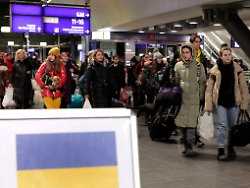“Hard but fair” to refugees
“We are facing a historic challenge”
By Marko Schlichting
3/15/2022 3:03 am
2.8 million people from Ukraine have left the country, around 147,000 of them have registered in Germany. Most of them arrive in Berlin. Social Senator Kipping describes the situation in the capital in “Hart but fair”.
In Ukraine, the situation is hopeless for many civilians. More and more people are fleeing the war. In Germany alone, almost 147,000 refugees were registered by Monday afternoon, and more than 2.8 million across Europe. However, their actual number is likely to be significantly higher, as people from Ukraine do not need a visa to enter the EU. However, refugees must register if they need financial support.
“Hart aber fair” on Monday evening on ARD will be about the challenges that the refugees are facing society and how you can help them at the moment.
“Never say anything”
All attempts at diplomatic mediation have so far been unsuccessful. Nevertheless, SPD leader Saskia Esken says in “Hart aber fair”: “We will do everything we can to end this conflict as quickly as possible. We must ensure that this brutality does not continue.” Esken answered the moderator’s question as to whether NATO soldiers would still not be deployed in Ukraine: “I believe that we have arrived in a situation where we should never say anything. We don’t know how things will turn out the situation will continue to develop.”
It is just as unclear how the number of refugees in Germany will develop. One thing is certain: it will increase. Katja Kipping from the left is a social senator in Berlin. The capital has now become the hub for people arriving in Germany from Ukraine. That was clear to her the day after the war began, says Kipping. “Berlin must now open hearts and arms and be there for refugees,” she said. “So I decided that the refugees would all be taken in by us in the arrival center and that we would immediately start looking for shelter.” Many volunteers, but also their administrative staff, have been on duty around the clock since the beginning of the war in Ukraine. “But we also know that this is just the beginning,” says Kipping.
“More and more people in need of care”
She noticed a change in the refugees, says Kipping. At the beginning of the war, refugees arrived whose first goal was to work in Germany. “Now we realize that more and more vulnerable, endangered groups are arriving.” She tells of a whole bus with deaf people who fled from a home. “The first thing people need is a bed and something to eat. But we also realize that we have to create additional needs.” Sign language interpreters would have had to be found for the deaf people.
However, many people also have individual problems, says Kipping. So many families come from Ukraine who bring pets with them. Even the cage for a child’s rabbit can pose a problem. “There is so much to think about,” said the politician. “I’m all the more excited that so many people in Berlin showed their best side.”
With its willingness to help, Berlin sent a wake-up call to the other federal states. “I’m glad that was heard,” says Kipping. She has received letters from many communities that have prepared for refugees and are now asking when they will finally come.
Kipping appeals to German citizens
But when it comes to accepting refugees from the Ukraine, we are at the very beginning. Katja Kipping knows that too. She says: “We are facing a historic challenge.” And in this situation, everyone has to ask themselves whether they want to solve problems with others or whether they want to roll them out with pleasure. “The more people opt for the ‘Solution-oriented team’, the easier it will be for us to tackle the tasks that lie ahead of us.”
